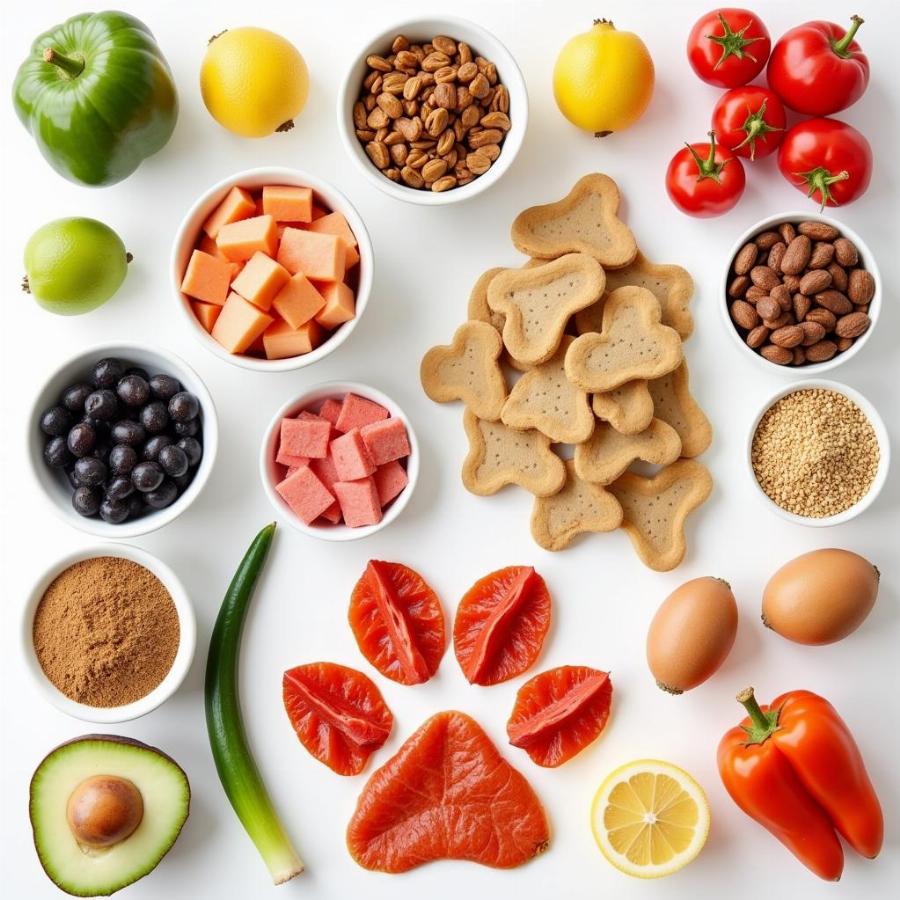Goldfish crackers are a popular snack for humans, but can dogs eat goldfish crackers? Many pet owners wonder about the safety of sharing this common treat with their furry friends. While a small amount might not cause immediate harm, goldfish crackers aren’t the best choice for your canine companion. This article will delve into the reasons why, explore healthier alternatives, and answer all your questions about dogs and goldfish crackers.
Why Goldfish Crackers Aren’t Ideal for Dogs
While the occasional goldfish cracker probably won’t send your dog to the vet, they offer little nutritional value and can contribute to several health issues. One primary concern is the high sodium content. Excessive sodium can lead to dehydration, high blood pressure, and even sodium ion poisoning in dogs. Goldfish crackers also contain ingredients like onion and garlic powder, which are toxic to dogs, albeit in small amounts in these crackers. Additionally, the refined carbohydrates in goldfish crackers can contribute to weight gain and dental problems.
The Sodium Problem in Goldfish Crackers
Dogs are more sensitive to sodium than humans. Even a small serving of goldfish crackers can contribute significantly to their daily sodium intake. Over time, this can put a strain on their kidneys and lead to serious health complications. If your dog ingests a large quantity of goldfish crackers, look out for symptoms of sodium poisoning, such as vomiting, diarrhea, tremors, and seizures.
Hidden Dangers: Onion and Garlic Powder
While seemingly insignificant, the onion and garlic powder used for flavoring in goldfish crackers can be harmful to dogs. These ingredients contain compounds that damage red blood cells and can lead to anemia. While the amount in goldfish crackers is generally small, it’s still best to avoid them altogether.
Empty Calories and Dental Issues
Goldfish crackers offer little nutritional benefit to dogs. They’re packed with refined carbohydrates that provide empty calories, contributing to weight gain and increasing the risk of diabetes. The sticky texture of goldfish crackers can also cling to your dog’s teeth, promoting plaque buildup and dental disease.
What to Do if Your Dog Eats Goldfish Crackers
If your dog sneaks a few goldfish crackers, don’t panic. Monitor them for any unusual behavior. If they consume a large quantity, contact your veterinarian immediately.
Providing Fresh Water is Crucial
Ensure your dog has access to plenty of fresh water to help flush out excess sodium. This is particularly important if they’ve eaten a significant number of goldfish crackers.
Healthier Snack Alternatives for Your Dog
Instead of goldfish crackers, opt for dog-specific treats or healthy human foods that are safe for canine consumption. Consider options like carrots, apples (without the core and seeds), blueberries, or plain cooked chicken or fish.
Choosing the Right Treats for Training
When training your dog, use small, healthy treats designed specifically for dogs. These are formulated to be nutritionally balanced and appropriate for their digestive system. Consider using a treat bag for training dogs to make training sessions more convenient.
Are Pretzels Safe for Dogs?
Just like goldfish crackers, pretzels are also high in sodium and offer little nutritional value for dogs. It’s best to avoid giving them to your furry friend. For dogs with sensitive stomachs, choosing the right food is essential. Learn more about dog food for dogs with sensitive stomachs to ensure your pet’s digestive health.
 Healthy Dog Treat Alternatives to Goldfish Crackers
Healthy Dog Treat Alternatives to Goldfish Crackers
Can Dogs Have Cheese Crackers?
Cheese crackers share similar drawbacks with goldfish crackers, including high sodium content and minimal nutritional value. They’re not recommended for dogs. If you’re looking for low sodium dog food, explore our resources to find the best options for your pet.
Conclusion
While the occasional goldfish cracker likely won’t cause significant harm, it’s best to avoid giving them to your dog regularly. Prioritize healthy, dog-friendly treats and snacks to ensure your furry companion receives the optimal nutrition they need to thrive. Remember, a balanced diet and proper care are crucial for a long and happy life for your pet. So, the next time you’re reaching for a handful of goldfish crackers, remember that your dog deserves a healthier, more nutritious treat.
FAQ
- What should I do if my dog eats a whole bag of goldfish crackers? Contact your veterinarian immediately.
- Are there any types of crackers that are safe for dogs? Some plain, unsalted crackers might be okay in moderation, but always check with your vet.
- What are some good alternatives to goldfish crackers for training? Small pieces of cooked chicken, carrots, or dog-specific training treats are excellent choices.
- Why is sodium bad for dogs? Excessive sodium can lead to dehydration, high blood pressure, and kidney problems in dogs.
- Can goldfish crackers cause allergies in dogs? While rare, some dogs may be allergic to ingredients in goldfish crackers.
- Are flavored goldfish crackers worse for dogs than original? Yes, flavored varieties often contain additional ingredients, like onion or garlic powder, that are harmful to dogs.
- Can puppies eat goldfish crackers? No, puppies are even more sensitive to sodium and other potentially harmful ingredients in goldfish crackers.
Further Reading
You might also be interested in reading about can dogs have goldfish crackers for more information.
Beaut Dogs is your trusted source for expert advice and valuable insights into the wonderful world of canine companionship. We offer a wealth of information on all aspects of dog ownership, from choosing the right breed to providing the best possible care. If you need personalized assistance, please don’t hesitate to contact us via Email: [email protected]. We are always happy to provide detailed and accurate answers to your questions. Visit Beaut Dogs today to discover more!